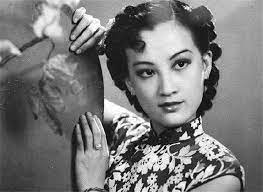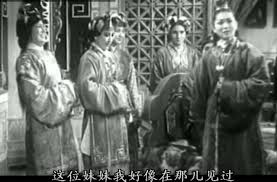Two from Zhou Xuan
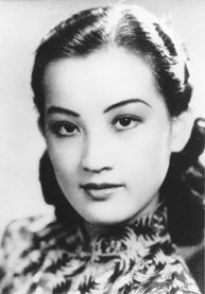
Cinema Epoch has released nearly 20 pre-1949 Mainland Chinese films onto
DVD over the past few years. Not being particularly knowledgeable about this
period in film, I can’t really access whether most of these films are considered
classics or not – though even I have heard of a few of these such as Song
at Midnight, Spring in a Small Town, The Spring River Flows East and Street
Angel. A list of their available films can be found here. A number of the
DVD releases contain two films which isn’t a bad deal at all. From the two
films I have watched so far, it seems evident that the print sources were
not cleaned up and so there are plenty of scratches, occasional poor contrast
and missing frames as one might expect from old films like this. It does
appear that a few of the DVDs have essays within, but that wasn’t the case
with the two I looked at which is a shame because knowing so little about
the films, the directors, the actors and the industry it would have been
nice having some context given. It especially would have been great if they
had translated the credits so I could name the actors, but no such luck.
Still it is obviously a terrific opportunity to see many films that have
never been available and to get a small peek into the dream machine that
was once Shanghai. If anyone has seen and enjoyed some of the other films
on the label, feel free to recommend them to me.
Both films that I looked at starred the legendary Zhou Xuan, who was born
in 1918 and died at the age of 39 in 1957 in Shanghai. Her life was rather
a sad one full of broken relationships, broken promises and mental breakdowns.
But she is still cherished today though not so much for her acting as for
her singing and is nicknamed “The Golden Throat”. Though she was not the
first actress/singer to appear in Chinese film, Xuan is credited by many
for popularizing Mandarin pop music in films. Her acting ability seems in
dispute – Stephen Teo refers to her as a “rather poor actress” but I thought
she had great presence in a film I saw at the HKIFF two years ago, Secrets
of the Forbidden City (1948), which was one of her final films and I think
she is charming in Street Angel. I admit though that in Dream of the Red
Chamber, her character nearly disappears in a state of ennui. The best write-up
I found on her was on the Chinese Mirror site.
Here are two quickie reviews on these last two films that have been released
by Cinema Epoch.
Dream of the Red Chamber a.k.a. Dream of
the Red Mansion
Director: Bu Wancang
1944
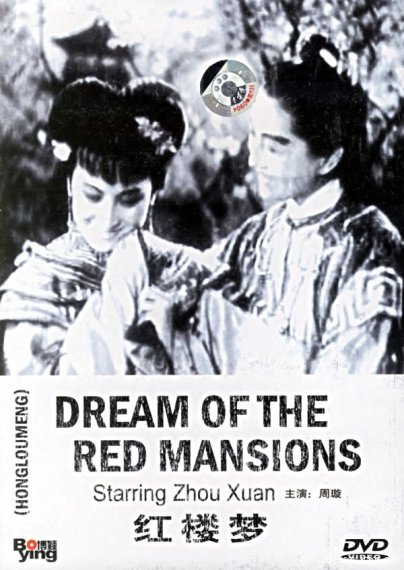
Previously, I had already seen two film versions of the classic 18th century
Chinese novel by Cao Xueqin about the lives and eventual downfall of a privileged
Beijing family. It is a book that is near and dear to the Chinese soul and
even has a term for the study of it, Redology. There have been many other
film versions of the novel as well as TV series and Chinese Operas about
the subject. From what I have read about the book, it contains numerous plot
lines about a large number of family members, but the three film versions
I have seen – this one and the two from the Shaw Brothers (1961, 1977) –
focus primarily on the tragic romantic triangle between Jia Baoyu, the young
heir of the family, and two of his female cousins – Lin Daiyu and Xue Baochai.
These three films for the most part ignore the rest of the family except
as to how they impact this trio.
The story is I am sure familiar to most of you in one form or another so
I will be very brief. Baoyu is a very immature young man who very much prefers
the company of the women and female servants in his family (“woman is made
of water, man is made of mud”). A cousin, Daiyu, comes to stay with the family
after her mother dies and she and Baoyu are attracted to one another though
in a teasing flirtatious manner. Later the other cousin Baochai shows up
as well and a mild pouty competition breaks out between the two women for
Baoyu’s attention, but he clearly has been won over by Daiyu. But Baochai’s
mother connives to set up a marriage between her daughter and Baoyu and the
inevitable tragedy ensues for one and all.
This version unlike the two Shaw films is a straight on drama – not a Huangmei
Opera as were those two films (though Zhou Xuan who portrays Daiyu does sing
two snippets of songs) and thus it has more time to explore a little around
the periphery of the story – in particular showing and strongly hinting at
Baoyu’s sexual relations with his female servants and the trouble this causes.
Interestingly though, as in the Huangmei versions Baoyu is played by a female.
The world shown in the film is completely feminine – other than Baoyu, men
rarely intrude and their presence is clearly not wanted. So in that respect
it is a rather fascinating glimpse into what goes on behind the private walls,
but overall unfortunately the film is much too slowly paced and generates
little passion at all. The actors all look too old for this adolescent love
story and Baoyu is such a spoiled petulant brat that it is hard to take his
love seriously – or that of the women for him. He tragically is unable to
grow up until it is too late leading to an ending which is actually the strongest
part of the film. Zhou Xuan appears to basically sleepwalk through her role
and her fate brings out little emotion from the viewer. I’d recommend either
of the Shaw versions over this one. One other version that I would love to
see is the 1952 Modern Red Chamber Dream directed by Yue Feng and starring
Li Lihua as Daiyu , Ouyang Shafei as Baochai and Yan Jun as Baoyu and is
according to Teo a modern day Marxist interpretation of the classic story.
As you may have noted, the film was made in 1944, well after Shanghai was
occupied by the Japanese in 1937. Many actors and directors fled Shanghai
for other parts of China/Hong Kong or simply refused to work for the Japanese
who attempted to continue the film industry. The Japanese set up a coalition
of film companies that was called Huaying and the company produced over 100
films during the war years. After the war ended there were many charges of
collaboration thrown at many actors and directors who had continued to work
under the Japanese, but many of them such as Zhou Xuan, Li Lihua, Ouyang
Shafei, Nancy Chan and Bai Guang seemed to have escaped unscathed for the
most part – but often wisely moved to Hong Kong.
In the HKIFF book, “Cinema of Two Cities: Hong Kong – Shanghai” there is
a fascinating article on the Shanghai film industry during this period. Though
the Japanese (with one intriguing exception) tried to force the film industry
to focus on films with a pro-Japanese view, for the most part the films made
were basic genre entertainment films. One Japanese critic disdainfully wrote
“70-80% of the films were about triangular love and family affairs” – Red
Chamber fitting this description fairly well. The director Bu Wancang did
not fare quite as well. He had been a very popular director for years. One
of his hits was Mulan Joins the Army in 1939 starring Nancy Chan. It was
a patriotic film about repelling foreign invaders but it was made in the
foreign concessions of Shanghai – films that were termed “Orphan Island”
films. But once the Japanese took over those areas in 1941, Bu made two propaganda
films for the Japanese and after the war his career never got back on track
because of the dark cloud he was under. Interestingly, the Japanese attempted
to do the same thing once they occupied Hong Kong but everyone refused to
co-operate and no films were made.
Street Angel
Director: Yuan Muzhi
1937
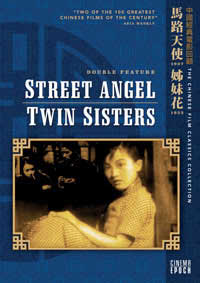
Street Angel was a real hook to the cranium from right field as I wasn’t
prepared for what an amazing film this is. Not so much for the story which
likely falls very neatly into the leftist social realism films of the period,
but for the marvelously inventive technique and cinematic eye of the director
Yuan Muzhi. This is particularly impressive in that he was only 28 years
old at the time and that Street Angel was only his second film – the first
by the way sounding more than a little compelling – a dark urban musical
called Cityscape (1935). Yuan came from a theatrical background as an actor
and this clearly influences his use of the actors in this film. Cinematic
influences pile up as well – primarily from the silent era – from the Russian
directors to the German expressionists to the sly comedy of Chaplin are all
mashed together in this visually delicious potluck. It almost seems as if
Yuan is making a silent film with sound – many scenes play out in wordless
pantomime and the strongest moments are those of dramatic gestures or stark
expressions caught in the amber of the lens. He neatly uses sliding frames
sometimes to transition from one scene to another or in one wonderful instance
the camera zooms up the opening of a trombone to come out in another location.
After the Japanese invaded, Yuan left for Yanan where he joined the Communist
Party and after the Civil War, he became quite a big honcho in the film bureaucracy
in China. I am not sure if he directed any other films before he died in
1978.
The film begins in a chaotic montage of neon signs, street scenes and nightclub
carousing until it settles first on a tall grandiose building only to slowly
pan down to the slums of Shanghai where a festive wedding parade is making
its way through a narrow crowded street with a marching band leading the
way. One of the trumpet players is Chen (Zhao Dan) who is having trouble
with the water in his instrument and having his friend Wang (Wei Heling)
accidentally stepping on his feet. The shots careen around some more in a
montage of onlookers sticking their faces out of windows and doors until
the camera settles on a young woman waving to Chen. This is Xiao Hong (Zhou
Xuan) who soon has to quickly rejoin her accompanist Wen inside a tea house
where she is a singsong girl looking for customer requests. She is clearly
not thrilled to be doing this or being with Wen as she plays constantly with
her hair and seems totally uninterested in her song. Nevertheless, the songs
became giant hits and Zhou Xuan was on her way to being a legend. The lyrics
of the songs are shown on screen and were apparently done karaoke style back
then so that the audience could sing along and we can happily watch the bouncing
ball!
Whether it is not clear from the subtitles on the DVD or whether scenes are
missing I can’t say, but from reading other sources it seems that Xiao Hong
and her older sister Xiao Yun (Zhao Huishen) have escaped from the Japanese
in Manchuria and have settled in Shanghai – but in a circumstance where they
are clearly very subservient to a married couple who put them up. This couple
makes Hong sing and makes Yun do even worse – she is a street walker always
in the dark and on guard from police arrest. How this all came to be I am
not sure. Yun’s profession has made her extremely bitter and something of
a pariah to her neighbors – but Hong still loves her deeply and Yun is very
protective of her little sister.
Gu, a gangster, shows an interest in Hong and her “guardians” set out to
sell her to him. Chen though takes her away to another part of town along
with his friend Wang and they try and plan their future. Yun later joins
them as well and Wang begins to fall for her, but Gu and Wen track them down
and tragedy occurs in a strangely abrupt and somewhat inconclusive ending.
The final shot is another pan of the statuesque building where the film began
as if to say the little lives down below on the street just don't matter.
The story is not really clichéd but certainly basic, but everything
else makes it the classic it is considered to be. Yuan keeps the film from
being too oppressively dark with numerous comic scenes and moments of bonhomie
between friends – but clearly his leftist politics are showing. The use of
lighting and shadows and the acting is very silent film stylized with broad
expressions and dark eye shadow, but very effective – Zhou Xuan is utterly
beguiling as the innocent impudent singsong girl with multiple impish expressions
crossing her face faster than cars on a freeway, Zhao Huishen as the older
sister plays the role almost as a wilting melancholy flower and some of the
static shots of her are decimating, Zhao Dan is by turns comic and moving.
Zhao Dan had quite the interesting life – during the war he was arrested
by a warlord and kept in prison for a number of years, after being released
he returned to Shanghai and stayed on in China after the Civil War. He became
a well-regarded actor through the 1950’s in some important roles but he was
arrested during the Cultural Revolution and jailed for five years. He died
in 1980.


